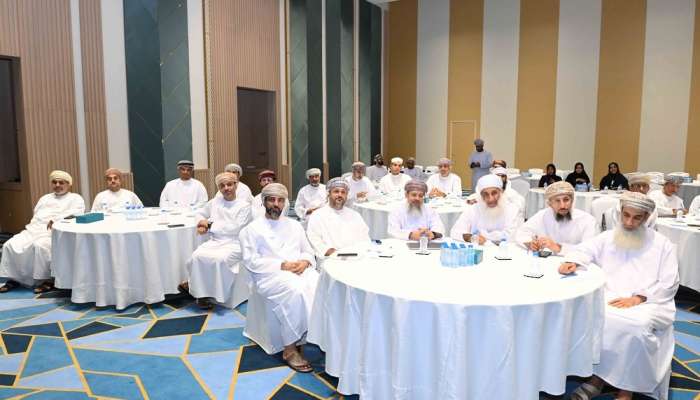
Muscat— The first meeting of endowment institutions in Oman, organized by the Ministry of Endowments and Religious Affairs in Muscat today, addressed the challenges facing endowment institutions and compliance standards.
The event was attended by Ahmed Saleh Al Rashdi, Undersecretary of the Ministry of Endowments and Religious Affairs.
The Undersecretary stated that this inaugural meeting serves as a crucial platform bringing together all endowment institutions, both public and private. In a statement to Oman News Agency, he noted that the meeting, attended by 35 institutions, discussed challenges and solutions for endowment entities, along with implementation strategies.
He highlighted the ministry’s launch of the Endowment Institutions Readiness Assessment initiative, which evaluates institutions across governance, regulation, compliance, board formation, executive management, and investment. Each criterion carries a different weight in determining overall readiness.
Al Rashdi emphasized that the average readiness of endowment institutions reflects their maturity, noting that Oman’s endowment history spans over a thousand years and remains active today. He explained that modern endowment institutions operate professionally, with structured boards, executive management, educational committees, and risk, legal, and investment departments.
While institutional management of endowments in Oman is relatively new, Al Rashdi acknowledged significant progress, attributing it to the vital role these institutions play in serving society—particularly in health and education. The ministry aims to strengthen public trust in endowment institutions, which now exceed 70 in number, including prominent entities.
The ministry acts as a regulator, legislator, and overseer, having established governance frameworks for both public and private endowment institutions in collaboration with a governance firm. Additionally, it mandates external auditors for these entities.
On his turn, Hilal Hamad Al Sarmi, Executive Director of the Athar Health Endowment Institution, stressed the importance of this first meeting in highlighting the role and achievements of endowment institutions. He told Oman News Agency that while these institutions are still nascent in Oman, governance-based operations require time to fully develop. Regular meetings, he added, would enhance awareness of their programs and facilitate experience-sharing among stakeholders.
Al Sarmi pointed to financial constraints, the lack of core supporters, and difficulties in initiating endowment investments as key challenges. He called for collaborative investments between institutions and the ministry, particularly in financial digitization.
Athar, he noted, focuses on healthcare improvements, partnering with medical institutions and seeking donors to fund essential equipment and medicines.
Meanwhile, Eng. Mohammed Salim Al Busaidi, Board Member of the Bousher Endowment Institution, described the meeting as pivotal in uniting stakeholders. He told Oman News Agency that institutional endowments are still "new" in Oman, with governance charters, boards, and executive councils in place under the ministry’s oversight. The meeting, he said, provided a forum to discuss challenges and exchange expertise.
Al Busaidi highlighted the ministry’s role in offering investment opportunities through endowment assets, noting over 39,000 endowment assets in Oman—many requiring investment. He urged the ministry to enable institutions to capitalize on these funds.
For his part, Dr. Badr Khalfan Al Rashdi from Sumail Public Endowment Institution stated that the meeting aimed to address challenges faced by both public and private endowment entities while showcasing their experiences. He emphasized Oman’s deep-rooted endowment heritage but stressed the need for institutionalized operations today, citing governance, revenue generation, investments, and partnerships as key hurdles. Emerging institutions, he added, face challenges in revenue streams, marketing, investment expertise, and workforce development.
During the event, Dr. Mohammed Fakhri Suwailah from Bank Nizwa gave a visual presentation titled Accounting Standards for the Endowment Sector, covering financial accounting, auditing, and professional ethics. He outlined core accounting principles, including monetary unit, historical cost, revenue recognition, materiality, full disclosure, accrual basis, and consistency. Endowment assets, he noted, are classified as immediately usable or intangible.
The meeting underscored the growing institutionalization of Oman’s endowment sector while addressing financial, operational, and governance challenges to enhance its societal impact.